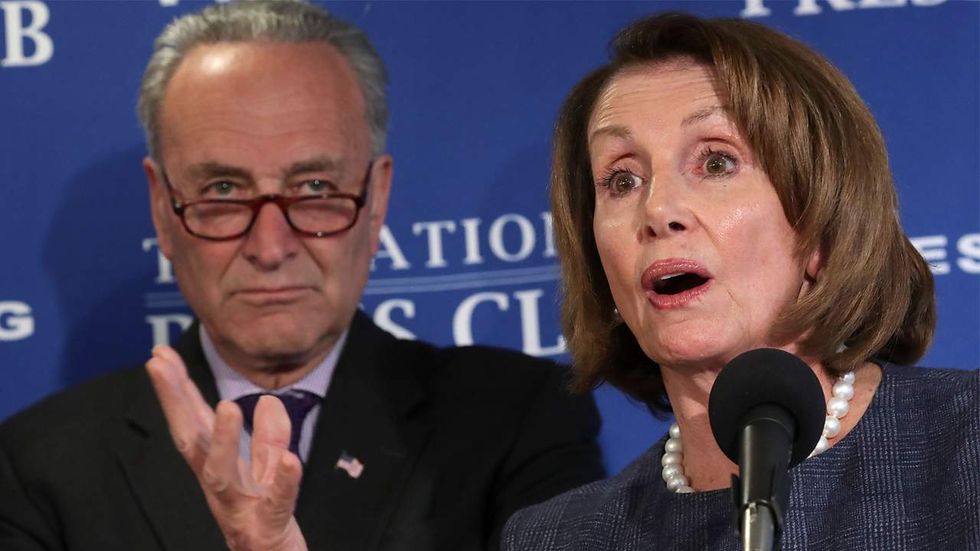
Justin Haskins argues the Democrats' new "Better Deal" plan would be an economic disaster. (Chip Somodevilla/Getty Images)

Congressional Democrats rolled out their “Better Deal” plan to improve the U.S. economy on Monday, but this weak, ineffectual, pathetic set of policies won’t help middle-income American families—the plan’s target audience—it would be economically disastrous.
The Democrats’ plan—which is clearly an overt attempt to win back the voters the party lost in key states such as Michigan, Pennsylvania, and Wisconsin during the Obama administration’s reign—is being sold as a proposal to help the “little guy,” who, according to Democrats, has been taken advantage of by big, evil, heartless corporations for decades.
By instituting more government works projects, regulations, restrictions, fines, and fees, Democrats say they’ll be able to give middle-income Americans a better life, but everyone would be much better off if the wildly incompetent, elitist ruling state in Washington, D.C., were to stay out of the way of state lawmakers, entrepreneurs, small businesses, and working people everywhere, allowing innovation to flourish and bureaucratic incompetence to be stamped out by the free market.
One of the primary ways Democrats say they’ll help working Americans is by creating a $1 trillion infrastructure plan that will provide high-paying jobs for people across the country. While there’s no denying important infrastructure, including many widely used roads and bridges, are crumbling, having the federal government throw $1 trillion at the problem is going to provide taxpayers with very little bang for their bucks.
The federal government has absolutely no incentive to spend tax dollars wisely, so massive federal infrastructure plans often end up creating very few jobs (relative to the costs), and when jobs are created, they are, by their very nature, temporary. Once the roads and bridges have been built, the jobs disappear, and because most of the projects will simply be rebuilding existing infrastructure, very little economic growth will result from this tremendous investment.
And where, by the way, are Democrats getting the funds to pay for this $1 trillion infrastructure plan? The national debt currently sits at $19.8 trillion, and the United States now pays $442.5 billion per year in interest. How many roads and bridges do you think could be built every single year with $442.5 billion? Instead of going toward protecting our borders, serving our veterans, or investing in the future, Americans literally throw hundreds of billions of dollars away every year on interest, and a $1 trillion spending spree will only make the problem worse.
Democrats don’t just plan on throwing lots of money (which they don’t have) at the economy. They also want to enact policies “to allow regulators to break up big companies if they’re hurting consumers and to make it harder for companies to merge if it reduces competition,” according to Senate Majority Leader Chuck Schumer’s op-ed published in The New York Times on Monday.
Schumer says the current rules unjustly favor businesses by allowing “huge corporations to merge, padding the pockets of investors.” He further claims these mergers are causing costs for airline tickets, cable television, and food, among other things, to increase dramatically.
The promise from Democrats to micromanage the economy using antitrust laws is particularly laughable, since its Democrats’ policies that have led to all these mergers in the first place. Why do you think it is small business owners are all-too-willing to sell off their businesses to larger corporations? The cost of doing business in many states across the country is astronomical. Trillions of dollars have been wasted over the past decade on regulations, compliance costs, and unnecessary taxes and certifications.
For instance, health insurance companies, pharmaceutical corporations, and hospitals have been merging at breakneck speed since Obamacare was first passed. Only one out of every three doctors are believed to be operating independently. This is mostly because the massive regulatory burden placed on all these businesses is more easily absorbed by a huge corporation. If Democrats leave their absurd rules, taxes, and regulations in place and also prevent businesses from merging, they will crush innovation and substantially reduce businesses’ willingness to invest in new services and products.
Further, tens of millions of the “investors” Schumer derides for earning a profit off corporations’ profits are regular working Americans trying to save for their retirements. Would he really prefer investors earn less? Would he really like to see the stock market go back to the Obama-era growth rates?
Democrats also pledge to create 10 million jobs by increasing support for apprenticeships programs and offering tax credits to companies that train new workers. While encouraging workers to forgo college debt and pursue skilled labor instead is important, the notion these policies will create 10 million jobs is pure fantasy.
Many industries already offer lucrative salaries and training opportunities, and plenty of skilled-labor jobs are available; there about 600,000 manufacturing jobs posted at any moment. Despite these opportunities, businesses can’t find anyone to work these jobs. It’s not because people don’t know how or because businesses aren’t willing to train workers. It’s because most Americans, especially younger people, find this kind of work “undesirable.”
Automation and technological advancements will soon replace many of these jobs anyway, so pursuing a career in many industries makes little sense for young people. Instead of trying to push workers into industries that won’t require human labor in 20 years, Americans need to rethink labor in the 21st century and find ways to create jobs without relying on the outdated models of the past.
All the Democrats’ “Better Deal” plan proves is Democrats still don’t understand basic economics. You would think after eight years of sluggish economic growth under Barack Obama, they would have learned their lesson by now. Voters certainly have.
Justin Haskins (@JustinTHaskins) is executive editor and a research fellow at The Heartland Institute.
Justin Haskins